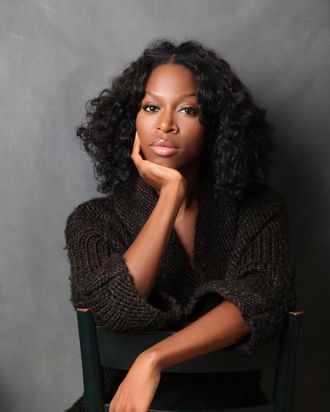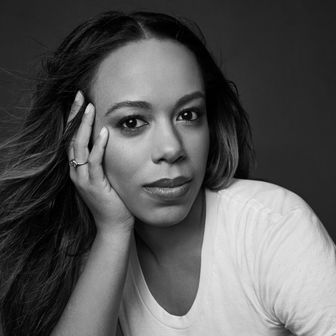
For years, Dove has promoted its mission of self-confidence and empowerment with its Real Beauty campaign — a marketing crusade designed to instill confidence in women that weathered its fair share of criticism. Its newest sales push is an initiative called Love Your Curls that coincides with the brand’s new curly line. Unlike past campaigns, Love Your Curls is packaged with a children’s e-book of 22 poems of the same name, available for free online, penned by Taiye Selasi, best-selling author of the novel Ghana Must Go. “If I can show you how amazing your hair is and how amazing you are, I’ll do it,” Selasi said. The Cut spoke with Selasi to learn about skin lightening, her poetry, and the objectification of natural hair.
Who is the book for?
I think all writers would answer similarly: [The book is for] me. The little girl who loved to read and had a huge imagination but didn’t often see reflections of her natural beauty in culture. I think of my goddaughters. I think about the girls in my life, friends from every different country and ethnicity, but many of whom happen to have curly hair. If I can show you how amazing your hair is and how amazing you are, I’ll do it. And I think this [book] does that.
You grew up in the United States, but you traveled extensively as a child. How did your global perspective shape your viewpoint on beauty?
I was always seeing new versions of identity and identity vocabulary. For example, I went to college and learned that race is a social construct created and perpetuated to form a hierarchy. I always knew that as a child, because we traveled so much. In Ghana and Nigeria, where the majority of the population is black, that concept [of race] doesn’t have any legs, it’s just not how you would identify yourself. What’s been beautiful about working on this project was writing the poems. I thought, Shouldn’t we say to little girls, “Love your hair, and love yourself”? Your hair is just one part of you, your skin is just one part of you, your body is just one part of you, but the most precious part of you is here [points to heart] and it looks like the most precious part of everyone else. You’re just a human being here on Earth, enjoying your brief stay. Here is some leave-in conditioner for the humid days on the journey! Here’s some Absolute Leave-In Serum, go on your merry way!
Would you say traveling helped you overcome some insecurities other little girls might develop?
In some ways yes, but in some ways no. I tend to see everything through the lens of power and a beauty ideal comes along with a power structure. By saying that what is beautiful is straight hair and light skin, that is also saying who is beautiful and who is powerful. That’s why you have women in West Africa lightening their skin and straightening their hair because they associate that beauty ideal with what’s better and good and right. In that extent, tragically, traveling in majority-brown countries I didn’t receive a more affirming message.
What do you think about how more women are choosing to wear their hair curly?
I think that’s part of the mirroring effect. This is why I think it’s so important to remember the imagery and words we put out, especially in the eyes of girls. If I’m on a website and it doesn’t affirm me, I can just click off, but children are much more sensitive and susceptible. I think imagery and vocabulary are incredibly important. Even for me. I am in my mid-30s. I have a New York Times best seller. One would guess that I’m pretty confident within myself. Yet, and still, I can’t tell you what rapturous joy I felt when Lupita Nyong’o burst onto the scene, because she’s African — I was like, There’s a name that just, in my ears, it sounds familiar. Her hair and her skin — in my 30s that still means the world to me, so what more for someone who’s 13? I don’t downplay it at all.
What are your thoughts on what some people would call the “objectification of natural hair“?
Two completely separate things come to mind. The first is something that I heard when we were at the Mom 2.0 conference, from a mother who said, “At home I’m always encouraging my daughter, who is 5, to love her hair, but I had to call her school because she said kids were always saying, ‘Can I touch your hair?’” She said, “I had to call her teacher. The kids mean no harm, but I don’t want my daughter to feel like a pet.” That phrase — Can I touch your hair? — the people who are asking it don’t pause to think about what that means to the person they’re asking to touch. We touch textures. We touch objects. We don’t tend to touch people or strangers like that. I reference this conference because it was sort of disheartening to hear that it still goes on; there has been a sense that having natural hair is wonderful, but if you are in a predominantly white environment and in West Africa, people tend to objectify it and treat it like a curiosity.
On the other hand, we as women fetishize our own hair. I was joking with a friend of mine, I was like, “I loved living in Fort Greene, but after a while I got tired of talking about my hair.” I worry that as women, we give more importance to our appearance than we might give to other things — our health, our well-being, our sense of wellness, our sense of self-love. Our culture has the ability to fetishize most things. I was talking to a friend about language — ”goal length” and “hair challenges” — that’s the language of competition and as a writer I’m very sensitive to the words we use. It’s like, a goal length is like a weight-loss goal. It’s that same language that tells women you’re here but you need to go there. Life is challenging enough. Do I really need to take hair challenges?
Have you always worn your hair naturally?
I had straight hair when I was young and I never want it again. But you know what? It doesn’t suit me. I want to be really clear. I don’t say that as sort of a pat on the back. My sister wears her hair straight. She looks amazing with it. It’s her choice. What I love is that she made that choice being fully empowered. She doesn’t feel like she has to have straight hair, she’s just enjoying this haircut right now. And I don’t look at her and think, You’re self-hating. But me, I just like it better like this. I have a big face. I have a big mouth. I have big cheeks. I have big eyes. I have big shoulders. I should have big hair.
This interview has been condensed and edited.





